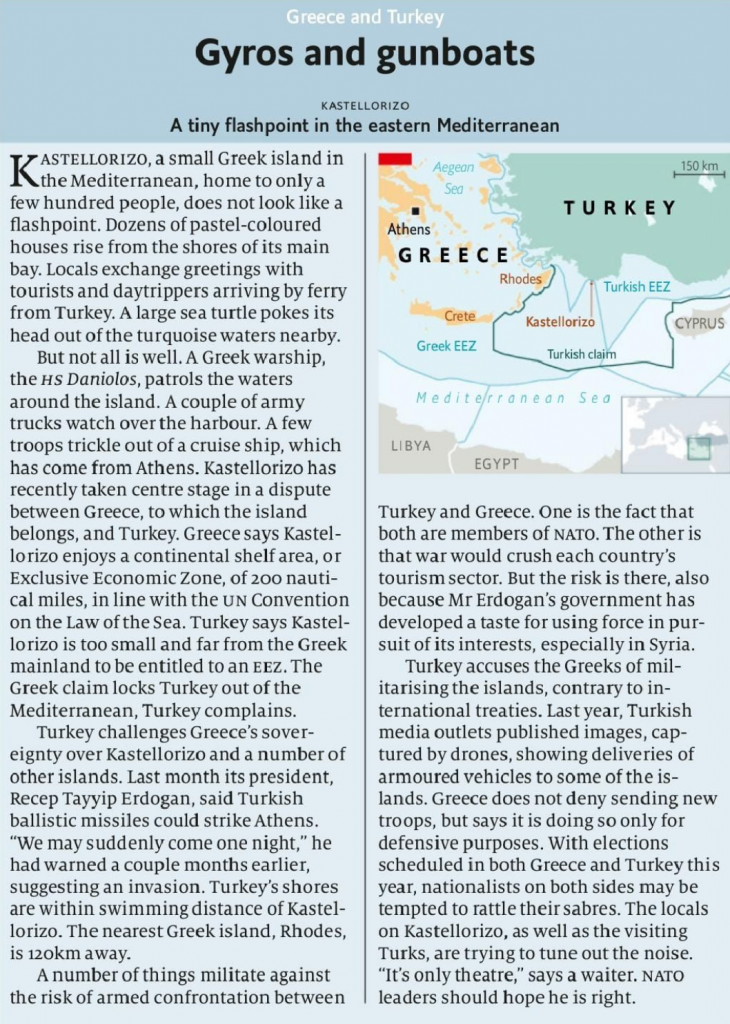Blanca Garrido Martín. Opositora a carrera diplomática.
«It is your concern when your neighbour’s wall is on fire» – Horace
RESUMEN
El artículo se enfoca en cómo países vecinos pueden mejorar sus relaciones y cooperar en pos de objetivos comunes. Hablamos poblaciones entre Turquía y Grecia, y los tratados de seguridad fronteriza entre Marruecos y España. También se abordan situaciones de confrontación, como la división permanente entre Corea del Norte y Corea del Sur, y la falta de acuerdo entre Marruecos y Argelia en relación al Sáhara Occidental. Se enfatiza la importancia de la cooperación entre países para enfrentar amenazas comunes, como los grupos terroristas en África. La solución pacífica de conflictos es la mejor opción y la fuerza solo debe ser utilizada en defensa propia.
ABSTRACT
The article focuses on how neighboring countries can improve their relations and cooperate towards common goals. We discuss populations between Turkey and Greece, and border security treaties between Morocco and Spain. Confrontational situations are also addressed, such as the ongoing rift between North and South Korea, and the lack of agreement between Morocco and Algeria over Western Sahara. The importance of cooperation between countries to confront common threats, such as terrorist groups in Africa, is emphasized. Peaceful conflict resolution is the best option and force should only be used in self-defense.

Traditionally, countries have had to deal with conflicts with their neighbours. From the beginning of history, humans have had the duty to protect their communities from the enemy, in other words, from foreigners. With the development of International Law and the concept of Iustum Bellum established by St. Thomas and developed by other authors of the Spanish International School such as Francisco de Vitoria, States started to consider a reduction in the use of force if there was any conflict. This intention was crystallised in the Charter of United Nations, signed by 192 countries, in the articles of which there are just a few exceptions to the non-use of force. However, this prohibition of the use of force has been violated several times. Sometimes, States plead self-defence, others, they are just carrying out a policy of deterrence towards their neighbours.
In this context, it is relevant to study cases where countries which have had a traditionally negative relationship could spelling it and become friendly States. To answer this, the essay will first examine the opportunities that engender a good relationship between neighbours. Subsequently, it will present real cases where different crisis lead the political affairs of countries. Finally, this paper will find a middle ground where, in fact, cooperation is needed to achieve common goals.
First, one of the opportunities of this current situation is that governments can cooperate in a win-win strategy. It does not mean that this relationship is absolutely healthy, but it can help governments to deal with a particular problem. In this sense, because of the genocide suffered by Greeks who were living in Turkey and the reprisal killings of Greek Ottomans by the Greek army, in 1922 a letter submitted to the League of Nations suggested that there should be an exchange between Muslim Turkish who were living in Greece and Greeks who were living in Turkey. After a number of conferences and meetings between the leaders of both governments, Ataturk, president of Turkey and his Greek counterpart signed the Convention Concerning the Exchange of Greek and Turkish Populations in 1923. Surely, this policy was not the most appropriate way to solve the problems of the massacres between both sides, but it was an efficient solution to stop the spilling of blood.
Another example concerns the treaties made by the Kingdoms of Morocco and Spain, two countries forced to be neighbours in spite of their differences in religion, languages and culture. Morocco and Spain share the door to Africa and also at the same time, the entry to EU borders. They have had to sign treaties and conventions regarding the borders’ security, otherwise it could be quite difficult for Spain to manage this issue.
However, there were also some confrontational experiences among the countries which do not have good relations. First, the two Koreas: in June 1950, North Korea, a communist regime, attacked South Korea, a liberal and capitalist country. This aggression kicked off a war for the control of the Korean Peninsula. Despite a ceasefire in 1953, the Korean War left a permanent division between the two neighbours.
The second example is between Morocco and Algeria, they share a common history, almost the same language and similar traditions. Nevertheless, they encountered problems in approving a deal regarding the Western Sahara. Instead of having amicable relations to benefit a trade exchange or movement of workers, they closed the borders almost 30 years ago. In the 80’s the five countries of North Africa (Maghreb area) tried to encourage cooperation between them and “the Union of Maghreb” was founded in 1989; however it only worked for 4 years and since then, it has been frozen without any success.
Looking to the future, according to some experts, such cooperation is needed. It is legitimate to encounter a conflict of interests between two countries which claim the same area for themselves. Nonetheless, experiences have showed that it is worthless to fight against it and that International Law could find a solution for both parties. One of the examples is the conflict between Chile and Argentina for the islands of Tierra De Fuego or “Beagle’s conflict”. In the end, it was resolved through papal mediation, and they signed a treaty in 1984. Another example is the relationship between Portugal and Spain: in the early XV century, these two countries were pioneers in navigation techniques and they fought for the hegemony of the “Age of Discovery”. There were often armed conflicts once two naos or vessels of each side met at sea. After negotiations and, finally, a wedding between the Royal families, this maritime conflict came to an end. Nowadays, Portugal and Spain are two important partners and, particularly, they have an amicable relationship between their citizens and private companies.
In addition, there are threats that need to be fought in common such as terrorist groups in Africa (Boko Haram in Nigeria, Daesh in Mali, etc). In this sense, countries need to cooperate to eradicate these radical groups.
In short, there are more opportunities with this kind of beneficial partnership than with ruptured relations. With the development of States and the International Law conflicts might be solved without using force or the threat of force as Turkey has done to Greece over the Kastellorizo issue these recent weeks. Moreover, it is legitimate to use force against armed groups that do not follow the principles of the United Nations to maintain peace and stability, the first purpose of the Charter.
Finally, it is possible to think that threat of international conflict could become real if nationalists take control of the government, for instance, the actions of Vladimir Putin against Western countries. It has yet to be determined if Ukraine and Russia will seek a peaceful treaty in the months to come.
25 abril 2023
ISSN: 2340 – 2482
BIBLIOGRAFÍA
Castro, J. A. (2008). Cooperación Internacional. Universidad para la Cooperación Internacional. https://www.ucipfg.com/Repositorio/MGTS/MGTS15/MGTSV15-09/Unidad_academica/5/1_IntroCooperaciónInternacional.pdf
Gómez Justo, J. C. (2013). El Frente POLISARIO: la historia de un movimiento de liberación nacional vivo. Revista internacional de Pensamiento Político, 8(1), 261–280. https://www.upo.es/revistas/index.php/ripp/article/view/3669/2904
Gosalbo Bono, R. (2016). El Frente Polisario, las normas de derecho internacional y el Derecho de la Unión Europea. Revista de Derecho Comunitario Europeo, 53, 21-77. doi: http://dx.doi.org/10.18042/cepc/rdce.53.01
Sancho, C., & Santomá, J. (2013). Resolución de Conflictos Internacionales: El arbitraje. IESE. Universidad de Navarra. https://www.iberglobal.com/files/arbitraje_iese.pdf

No one chooses its neighbour by Blanca Garrido is licensed under a Creative Commons Reconocimiento-NoComercial-CompartirIgual 4.0 Internacional License.
